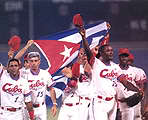|
The new history of Cuban baseball began to be written on January 14 th, 1962 , the exact date of the beginning of the national series, which little by little became part of the lives of the demanding and experienced fans of the Cuban audience.
Fidel Castro, who was then Prime Minister of the Revolutionary Government, referred to the baseball players who took part in the first national series as “common people, many humble boys who have been given the chance to play baseball, because they were humble, but they were exploited under the capitalist system (…), they were bought, they were sold (…). Baseball had also become a capitalist enterprise and now it has become a real sport”.
Very quick, the games of the professional winter league were just a memory. This elitist league completely took place in the Gran Estadio del Cerro (today’s Latinoamericano Stadium) with the participation of four teams: Marianao, Cienfuegos , Almendares, and Habana. Their rosters were conformed by some Triple A level players and even some players from the so-called major leagues.
Other teams began to appear. That was the case of Orientales, Centrales, Occidentales, and others named after the six existing provinces at the time: Pinar del Río, La Habana , Matanzas , Las Villas, Camagüey, and Oriente. Later in time, other emblematic teams of today’s Cuban baseball began to be formed. Some of them are Industriales, Santiago de Cuba , and Villa Clara.
The Cuban national team is considered among the best of the planet, even after the agreement of the International Federation of Amateur Baseball (IBAF) to allow the access of professional players to all the competitions of the Olympic cycle as well as to world championships and intercontinental cups.
Since the 1960’s the Cubans have conquered a great deal of titles that have turned the greatest isle of the Antilles to be one of the strongest exponents of this sport, practiced by more than a hundred nations of the five continents.
In several occasions the Cubans have achieved the World title, defeating strong teams such as those of Japan , the United States , South Korea , Taipei , Puerto Rico , and Nicaragua . Nowadays, the team holds the world title.
It has been more than four decades since the moment of the take-off and the certainty of the way they have followed can be appreciated in the fact that Cuba has won 23 of the 26 world championships they have taken part in. Moreover, in the remaining three they won two second places and a third one. Always the Cuban teams have been among the medal winners, but the followers expect their victory and they don’t forgive the defeat, even if it was only one and took the team to a second place. That exigent we are.
In Cuba, after the so-called Political Administrative Division in 1976, when the fourteen provinces and the special municipality of the Isle of Youth were established, they started to build modern baseball parks, some with room for 12 000 spectators, others for 25 000, and even some for 30 000 people.
Each of the 169 municipalities counts on several stadiums and even though they might not house the above-mentioned amount of people, they account for several thousands facilities that gather more than 350 000 baseball players in tournaments held in the neighborhoods.
The increase in the amount of teams taking part in the national classics has propitiated the appearance of a greater number of figures and we have already several generations of baseball players that have taken part in major-level tournaments in the island.
Sometimes more and sometimes less, the public has felt the generational change of baseball players. From the last, we can see that we no longer have players like Orestes Kindelán, a man that attained the figure of 487 homeruns; neither we see Antonio Pacheco, very effective in crucial moments; nor Omar Linares, a third baseman that many include among the best of all times; or the short-stop Germán Mesa, one of a kind in his position. Similar qualifications could be given to the Camagüey player Luis Ulacia.
Precisely these five aces of Cuban baseball traveled to Japan in 2002 with the aim of being part, some as trainers and some as players, in amateur and even professional teams of the Asian country.
Now the fans cheer the performances of Frederich Cepeda, Amaury Casañas, Michel Enríquez, Yulieski Gourriel and a many other young valuable players.
Since baseball was allowed in the program of Olympic Games, Cuba has won the titles in two of them: Barcelona 1992 and Atlanta 1996. However, in Sydney 2000 , Cuba fell to the second position, while the United States ’ team, managed by former major league player Tom La Sorda , won the Olympic title.
During the summer of 2004, at the Athens Olympics there were again eight contending teams and the Cubans were once again the champions and achieved their fourth Olympic title this time in a high-level competition where even the USA team was defeated during the classification stage previous to the Games.
In the gold-medal game celebrated in the Hellenic capital, Cuba defeated the Australian team; while in the match for the third position, Canada defeated the Japan team, favorite until that day.
Travel and watch baseball games.
www.cubanbaseballtravel.com
|










































